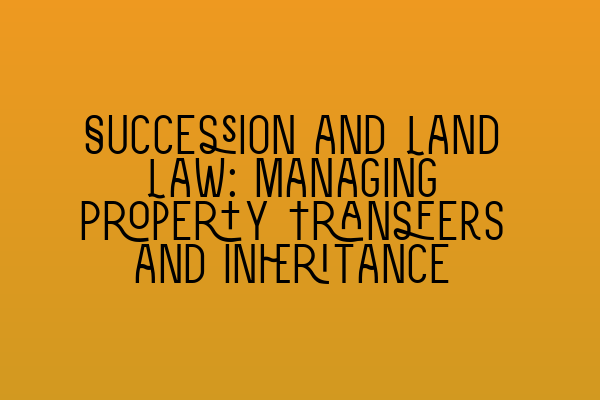Succession and Land Law: Managing Property Transfers and Inheritance
At SQE Property Law & Land Law, we understand the complexities involved in managing property transfers and inheritance. Succession and land law are integral parts of the legal system that govern the transfer of property upon the death of a property owner. It is essential to have a clear understanding of the legal framework and procedures involved to ensure a smooth transfer and avoid potential disputes. In this blog post, we will dive deeper into the intricacies of succession and land law, providing you with valuable insights into managing property transfers and inheritance.
Succession refers to the process by which property is transferred from a deceased person to their rightful heirs. It is crucial to understand that succession laws vary depending on the jurisdiction. In England and Wales, the law governing succession is primarily governed by the Administration of Estates Act 1925 and the Inheritance (Provision for Family and Dependents) Act 1975. These laws outline the rules for intestacy (when a person dies without a valid will) and provide provisions for challenging the distribution of an estate.
The first step in managing property transfers through succession is establishing whether the deceased left a valid will. A will is a legal document that sets out the deceased’s wishes regarding the distribution of their property. If a will exists, it must undergo the process of probate, which involves applying to the court for a grant of probate to confirm the validity of the will and appoint an executor to administer the estate. If the deceased died intestate, the law determines how their estate will be distributed among their relatives.
One of the critical factors in managing property transfers through succession is identifying the rightful beneficiaries. The law provides a hierarchy of beneficiaries, starting with the spouse or civil partner, followed by children, grandchildren, parents, siblings, and other relatives. However, it is important to note that certain individuals may be entitled to claim a share of the estate under the Inheritance Act 1975 if they can demonstrate that reasonable financial provision has not been made for them.
Once the beneficiaries have been determined, the next step is to transfer the property to their names. This involves transferring legal ownership, which can be done through various mechanisms such as conveyancing, assent, or transfer of shares in a property-holding company. It is essential to follow the appropriate legal procedures to ensure that the transfer is valid and legally binding.
In addition to property transfers through succession, managing inheritance also involves addressing any potential taxation issues. Inheritance tax is a tax levied on the value of an estate, and it is essential to understand the tax implications and plan accordingly. Seeking professional advice from a solicitor specializing in property and inheritance law can help you navigate the complexities of inheritance tax and devise appropriate strategies to minimize tax liabilities.
At SQE Property Law & Land Law, we are well-versed in handling property transfers and inheritance matters. Our team of solicitors has extensive experience in managing succession cases and can guide you through the entire process, ensuring that your interests are protected.
To prepare for the SQE exams, we highly recommend our preparation courses. If you are looking for SQE 1 practice exam questions or practice mocks for FLK1 and FLK2, we have a range of comprehensive resources to help you succeed. Additionally, you can find the latest SRA SQE exam dates on our website to plan your study schedules effectively.
In conclusion, succession and land law play a crucial role in managing property transfers and inheritance. By understanding the legal framework and following the appropriate procedures, you can ensure a smooth transfer of property to the rightful beneficiaries. If you require professional assistance in navigating the complexities of succession and land law, do not hesitate to reach out to SQE Property Law & Land Law. Our team of experts is here to provide you with the guidance and support you need.
